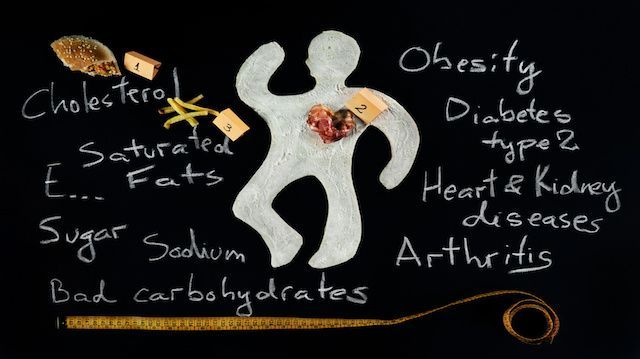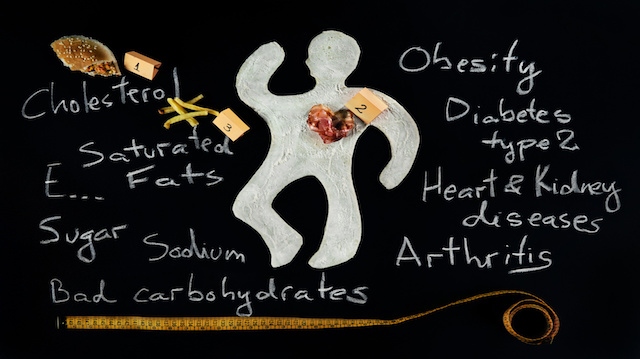
More than two-thirds (68.8 percent) of adults are considered to be overweight or obese, according to the National Institute of Diabetes and Digestive and Kidney Diseases. High body fat increases the risk for many diseases, namely heart disease, high blood pressure and diabetes. Your diet affects your health. New emerging data shows that a junk-food diet can tell your brain, “Let’s get fat.”
Junk food is food that is usually low in fiber and high in calories, fat and sugar (and it tastes good). Definitions can vary, but you pretty much get the idea.
Leptin keeps our weight balanced
Leptin is a protein made by our fat cells. It cruises into the bloodstream and knocks on the door of our brain and says, “I’ve had enough fat, you can slow down eating and you are ‘all clear’ to use energy for metabolic processes.” Using energy burns excess fat. The body balances and leptin production goes down. A healthy body is a balanced body.
Cool, right?
Leptin acts different in a “bad” diet
Well, this whole leptin-brain system works well when you’re eating a healthy diet. The body naturally balances itself. However, research has shown that when you eat a “bad” diet — a bad diet is high in junk food, which is high in fats — this great leptin-brain system goes a little haywire and makes you even fatter.
What?
That’s what we thought. If you have a “healthy diet,” the leptin-brain system functions to balance your body fat. If you have a “fatty diet,” the leptin makes you fatter.
How does this occur?
Normally when the leptin reaches the brain, the brain releases hormones that suppress eating and increase metabolic processes. This signals the body to burn fat and you don’t gain weight.
But for some reason, when you have a “bad” diet, leptin causes the production of more leptin (and this is not good). The brain gets overloaded and then resistant to the leptin over time.
When your brain is leptin resistant, the cycle goes the other way. Your brain puts out hormones that promote eating (your eating accelerates) and you gain weight quickly. Science is still figuring out the exact way that all of this occurs, but they have shown that it does occur.
Some research
 A 2000 study at the University of Florida showed that mice with a high-fructose diet fall into this “unhealthy diet” pocket and promote leptin resistance. The data suggests that fructose over time (in the diet) induces leptin resistance and accelerates (high fat–induced) obesity.
A 2000 study at the University of Florida showed that mice with a high-fructose diet fall into this “unhealthy diet” pocket and promote leptin resistance. The data suggests that fructose over time (in the diet) induces leptin resistance and accelerates (high fat–induced) obesity.
Another 2003 study, at the University of California, San Francisco, in mice suggests that individuals who are particularly lean because of increased leptin in the blood may develop rapid obesity under conditions of a high-fat diet.
They are discussing the normal leptin-brain cycle, where increased leptin reduces fat. Then if these “lean” individuals change to a high-fat diet, they would rapidly gain weight.
Eat healthy
Eat a healthy diet. A healthy diet promotes normal leptin-brain function. If you eat a healthy diet, you will have a healthy weight. Your body systems will balance. Not only does a healthy diet have to do with weight, it also has to do with lowering the risk of the major diseases, like heart disease, high blood pressure and diabetes.
In a 2012 study, at the International Food Information Council Foundation, 52 percent of Americans (that were polled) believed doing their taxes was easier than figuring out how to eat healthy.
We recommend reading more of our articles on a healthy diet and making changes (if needed) to your diet starting today. A healthy diet leads to a healthy body.
—Nikki Walsh
Nikki Walsh is a freelance writer and mom of two kids living in Southern California. She holds an MBA in marketing from University of California, Irvine and a bachelor’s degree in Biochemistry from UCSD. She has been practicing Kelee meditation for 19 years. When she is not writing she can be found out and about having fun with her kids.
Sources:
http://www.niddk.nih.gov/health-information/health-statistics/Pages/overweight-obesity-statistics.aspx
http://authoritynutrition.com/leptin-101
http://ajpregu.physiology.org/content/early/2008/08/13/ajpregu.00195.2008
http://www.ncbi.nlm.nih.gov/pubmed/12810541

